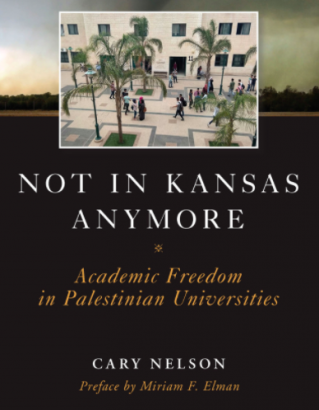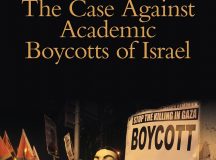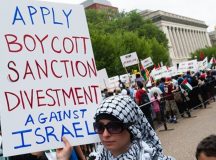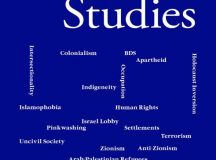Academic freedom is the liberty which academics have, within the confines of the law, to question and test generally-held beliefs, and to put forward different, sometimes unorthodox, maybe unpopular, alternative views without being at risk of losing their jobs or being silenced at their work. A complaint sometimes made against Israel is that it culpably suppresses academic freedom in Palestinian universities. This complaint is sometimes deployed by critics of Israel defending themselves against the charge that they focus too exclusively on Israel’s misdeeds at the expense of paying attention to other and worse political horrors elsewhere. Their reply is that academic freedom is a value especially in the care of academics everywhere, and so they have special reason to focus on Israel, since it’s illegitimately eroding academic freedom in vulnerable institutions, while purporting to be a liberal democracy which values academic freedom and free speech.
Cary Nelson’s new book: Not in Kansas Anymore: Academic Freedom in Palestinian Universities,[1] addresses this whole issue with exceptional thoroughness. He examines the state of academic freedom in Palestinian universities, and comments on the implications of this for the criticisms levelled by some Western academics, especially in the United States, against Israel’s handling of this matter. His central thesis is that academic freedom in Palestinian universities is indeed very badly eroded and in certain respects non-existent. It is true that Israeli measures are sometimes responsible for aspects of this erosion, where Israel has acted without sufficient justification and in ways that would have been better avoided; however Israeli interventions are greatly outweighed in their effect on academic freedom by measures taken by Palestinian students, academics, and wider political forces. These measures, often deployed by students though sometimes by faculty, involve intimidation and physical violence. They receive wide social support, have done so for many years, are very resistant to change, and are largely ignored by Western critics of Israel.
In Nelson’s view this singular focus on Israel’s impact on academic freedom in Palestinian universities is misplaced in three main ways: it fails to acknowledge the security context within which Israel has to operate; it fails to recognise Palestinian violence; and it fails to consider regimes, in the area and beyond, whose treatment of academic freedom is far, far worse. His book has useful and pertinent things to say about the first and third points, but it’s the second, central, one for which Nelson provides the fullest and most detailed examination, and the one on which I’ll focus here.
The book opens with an account of violent attacks on two senior academics in different Palestinian universities. One of these academics took some students to visit Auschwitz. In his absence, other students denounced him as a traitor, trashed his university secretary’s office, and threatened to kill him if he returned to the university. His academic union cancelled his membership; his university did not defend him (they eventually accepted his resignation); and he was the target of an assassination attempt. Academic freedom did not protect him. The second (unconnected) case involved a different academic, one who was opposed to reconciliation with Israel and was certainly not opposed to violence. Nonetheless when he criticised the Palestinian authorities, accusing them of corruption, he was arrested and imprisoned. Academic freedom did not protect him either.
In fact, much of the conflict in Palestinian universities is not focussed on Israel at all. There is violent conflict between groups which support Fatah and those which support Hamas, and also between splinter groups within these broader affiliations. Academic freedom for faculty is eroded because they are afraid of being branded by students as collaborators or normalisers, which can put their lives in danger. Administrators are too frightened to enforce respect for freedom of expression, and with good reason.
When debates in the United States about academic freedom in Gaza and the West Bank ignore the severity of threats such as these, they are thereby vitiated by a stultifying and corrupting neglect of highly relevant facts. Failure to acknowledge Palestinian violence effectively denies Palestinians agency, treating them as purely helpless victims. In Nelson’s view they are indeed victims, but they are also agents; he suggests that they should be seen intersectionally, victims both of unjustified aspects of the occupation, and of their own tradition of committing and celebrating violence.
Palestinian universities cannot plausibly be seen as serene and untainted sites for the pursuit of learning: they are too often socially and intellectually coercive environments where political debate is infused with physical violence. There is a violent campus culture with a lengthy history, and its threats to the safety and indeed the lives of students and faculty is the greatest erosion of academic freedom which they have to face. In fact the attacks on those who are seen as ‘normalisers’ or ‘collaborators’ are part of a general attack on dissent: this problem is not one exclusively for academic freedom. There is no free press in the West Bank or Gaza; dissenters are subject to arbitrary imprisonment, and many websites are simply banned.
Another locus of academic unfreedom resides in the curriculum: some of the more practical and technical subjects are adequately delivered, but in other cases the curriculum is corrupted by anti-Zionist and antisemitic indoctrination. Nelson cites observational research, by an academic from the Danish Institute for International Studies, into some literature teaching sessions at the Islamic University of Gaza. The tormented forcing of discussion (of a humorous children’s poem about cats!) into anti-Zionist and antisemitic conclusions is a quite extraordinary example of indoctrination, one which should cause any teacher of literature to weep with despair at the distortion of education which it represents.
One of the most interesting aspects of this short book lies in its methodology. So profound are the political divisions about the Israel-Palestine issue that it’s often quite hard to find sufficient agreement about the facts of the matter in hand to make discussion possible. Hence the particular importance of the provision of evidence for the claims being made, and of the quality of that evidence. In this respect Nelson’s work is especially impressive. He is a meticulous and relentless fact-chaser: he frequently cites research carried out by Palestinians, both Fatah supporters and Hamas ones, criticising Palestinian institutions (though often very selectively when treating the others’ misdeeds). Some of the work he draws on, and cites in his bibliography, is unreservedly hostile to Israel. He also draws on Israeli information, and cites a wide variety of journalistic, governmental, and academic research sources. As a result, this is one of those very few books where the footnotes are quite as interesting as the text.
Nelson concludes, persuasively, that the main conflicts in Palestinian universities are Palestinian-on-Palestinian ones, and that they are the most significant threats to academic freedom in those institutions. He also concludes, again persuasively, that the assumption that Palestinian universities are educational institutions just like Western ones is simply false, as is the assertion that their academic freedom is undermined solely, or even primarily, by an aggressively militaristic Israel. Such claims are based on an ignorance which is often wilful, and thus corrupt. Hence the title of the book – Gaza really isn’t like Kansas, and commentators ought to be fully aware of this.
There is one further point that might be made about the impact of this book. Having read the descriptions, often by Palestinian writers, of the intimidation and violence threatening students (and faculty) in these universities, it’s hard not to feel desperately sorry for those young people who have so little freedom to try out a range of different ideas for themselves, or even to entertain the conception of human autonomy and dignity which such freedom is thought to support. And it’s hard not to feel a measure of contempt for those who, in the safety of their Western universities, carefully turn their eyes away from the forces denying Palestinian students that freedom, in order to indulge their hostility to the Jewish state.
References
[1] Not in Kansas Anymore is a considerably enlarged and more detailed version of chapter 10 of Nelson’s recent book Israel Denial: Anti-Zionism, Anti-Semitism, & the Faculty Campaign Against the Jewish State, reviewed by myself in Fathom in November 2019.






































